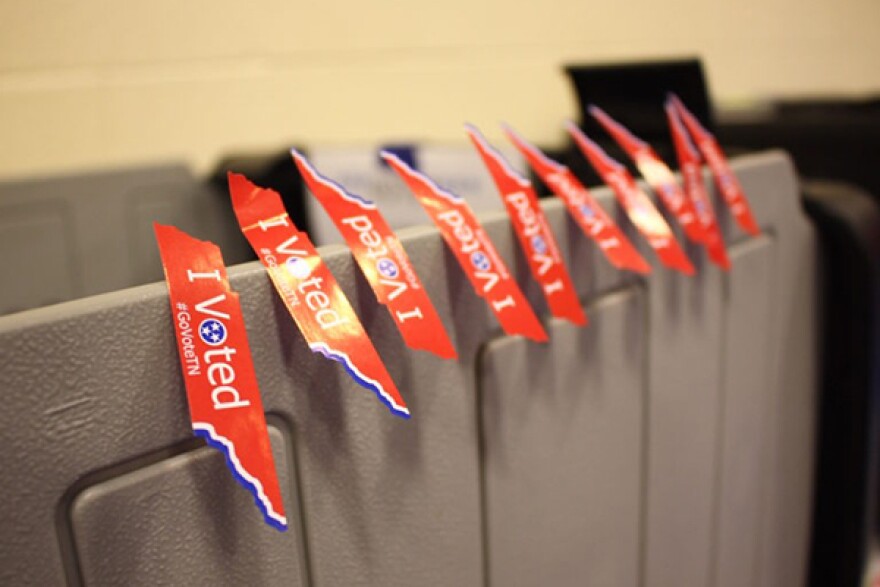As the nation marks the 100th anniversary of women’s suffrage here in the final state needed to ratify the amendment, not all Tennesseans can vote. Tennessee is actually one of the hardest states for people with felony convictions to get their voting rights back.
Morning Edition host Rachel Iacovone spoke with WPLN’s criminal justice reporter, Samantha Max, about the barriers that some people still face when it comes to voting and the resources available for those who want to get their rights restored.
Rachel Iacovone: So how big of a problem is disenfranchisement in our state?
Samantha Max: So, it’s a pretty big issue. In 2016, a report came out that found that more than 420,000 Tennesseans have lost the right to vote because of a felony conviction. So, to kind of put that in perspective, that’s about one in 12 adults of voting age, and it really has a disproportionate impact on Black Tennesseans. More than one-fifth of them are disenfranchised because of felony charges.
RI: But in Tennessee, most people with a felony conviction can get their voting rights restored. Only a few offenses like first-degree murder disqualify you for life. So why are so many people still unable to vote?
SM: There are just a lot of barriers in place. Sometimes it’s because people don’t have the information that they need. People just don’t always know that there is a way for them to get their voting rights back. And then there are people who committed their crimes elsewhere but now live and want to vote in Tennessee that have to get all this paperwork filled out.
And it’s difficult to know who can fill it out, what out-of-state officials to go to, and how to get that communicated back to officials here in Tennessee. So, it’s really a big maze of tracking down your charges, figuring out what forms to fill out, figuring out who needs to fill out those forms.
It’s really just a big hassle that even leaves some of our legal experts scratching their heads.
RI: And in Tennessee, each county can set their own fees and some of them are using that money to pay to run their courts. So the costs can be pretty high.
SM: You might have to pay a fee individually for each conviction on your record. So that could be one charge or half a dozen. And that really adds up. Plus, in Tennessee, you, on your end, have to pay any outstanding costs that come from that charge — so, if there are court costs, restitution.
Plus, we’re actually the only state in the country that requires you to be up to date on your child support payments. So, if you’re behind on that, then that’s another thing that’s going to be getting in the way of you being able to get your voting rights restored.
And there was one woman I spoke with whose story just really stuck with me. Her name is Mistie Dunmire. And she found out that she owed more than $900 in court costs stemming from two convictions that are actually almost 30 years old. And she’s not even sure what those costs come from.
Dunmire was just in her 20s when she was arrested twice for stealing to support a drug addiction. And now she’s just caught in this cycle of poverty that got her arrested in the first place.
She’s on a fixed income and with the COVID-19 pandemic, she’s been falling behind on her rent. And she was so excited to vote. But when she went to get her paperwork filled out, she found out she had these outstanding costs that no one had bothered to tell her about for three decades.
Here she is describing the day when she went to the courthouse and found out about these outstanding charges:
Mistie Dunmire: I was so excited until I got there that day, and I didn’t have $25 for either form. But it didn’t matter, because that way they weren’t going to fill it out anyway, because I owed [$639] on one case and $300 [and] something on the other. And so, when I called my friends, a couple of them that were going to sign up to vote, they were like, “Well, forget that!”
RI: So, what resources are available for people like Dunmire who want to get their voting rights restored but are struggling to navigate the system?
SM: There are a few different ways that people can get help with this issue. There’s a good amount of information on the Secretary of State’s website. That’s sos.tn.gov. And it explains who is eligible to get their voting rights back. And it also links to a bunch of the different forms that people might need.
Plus, there are both local and national groups that can help. Free Hearts is a Nashville-based nonprofit that supports families who have been impacted by the criminal justice system. And they’re currently running a texting campaign to help people who have questions about the process.
And that’s actually in partnership with the Campaign Legal Center. That organization is based in D.C. and helps people across the country get their rights restored. So, people who want to find out more about that can go to campaignlegal.org/restoreyourvote to get step-by-step information.





